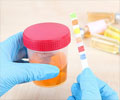A simple urine test to detect appendicitis may soon be available, if scientists have their way.
A simple urine test to detect appendicitis may soon be available, if scientists have their way.
Researchers at the Children's Hospital Boston have identified a protein in the urine that might be a tell tale sign of the condition.The significance of this finding can be understood from the fact that an easier way to detect appendicitis would reduce the risk of serious complications if it is missed, or of unnecessary surgery if it is wrongly diagnosed.
A research article featuring online in Annals of Emergency Medicine reveals that the Boston team used a technique called mass spectrometry to analyze 12 urine samples from children.
The researchers identified 57 compounds associated with immune response and inflammation, which might potentially be a sign of appendicitis.
They carried out further tests on 67 children seen at the hospital for suspected appendicitis, and were able to narrow the field to seven promising candidates.
According to the research team, a protein called leucine-rich alpha-2-glycoprotein (LRG) was the best candidate.
Advertisement
They also found that the more severe the disease, the higher the level of LRG was.
Advertisement
"Recent diagnostic advances have focused on advanced radiologic procedures, such as computed tomography and ultrasound, but these resources are not universally available and can delay diagnosis," the BBC quoted researcher Dr. Richard Bachur as saying.
"Although these advances have improved the diagnosis and decreased complications from appendicitis, CT scans also expose children to radiation that may increase the lifetime risk of cancer," he added.
The Boston researchers, however, concede that their findings may only be relevant to children, and that patterns of tell tale biomarkers may vary in older patients. They stress the need for more studies on adults.
Source-ANI
SRM














